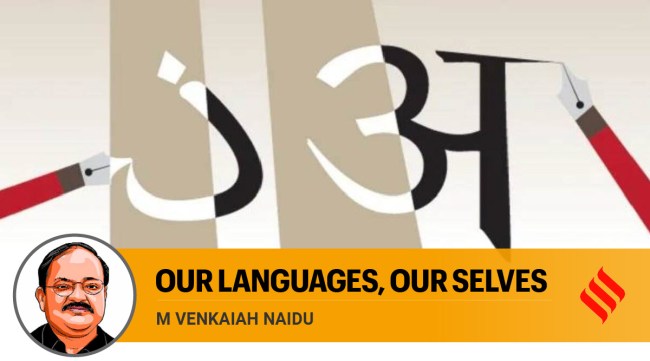Opinion Former Vice President M Venkaiah Naidu writes: We should shed colonial legacy by creating content in mother languages
Our emphasis on English has made education exclusive and restrictive. Limiting knowledge in technical and professional courses to a select few has made it inaccessible to a vast majority
 India is an ancient repository of hundreds of languages and thousands of dialects with rich linguistic and cultural diversity.
India is an ancient repository of hundreds of languages and thousands of dialects with rich linguistic and cultural diversity. In November 1999, UNESCO declared February 21 as International Mother Language Day in response to the declining state of many languages all over the world. This year’s theme, “Multilingual education — a necessity to transform education,” underscores the importance of using multiple languages in framing an impactful system of education. As UNESCO states, a monolingual system of education which relies on “providing education in only one language that is not necessarily shared by all learners may impact negatively learning performance, and the development of socio-emotional and foundational literacy skills.”
India is an ancient repository of hundreds of languages and thousands of dialects with rich linguistic and cultural diversity. It is in our mother tongue that we express, with authenticity, our deepest thoughts, feelings, values and ideals, as also our literary endeavours. Our languages, which are an integral part of our ancient culture, give us a sense of identity. The former UNESCO Director-General, Koichiro Matsura, highlighted the irreplaceable significance of one’s mother tongue when he observed that “the languages we learn from our mothers are the homeland of our innermost thoughts.”
The International Mother Language Day has added significance in the Indian context because of the threat westernisation poses to the survival of as many as 42 of our dialects and languages which have fewer than 10,000 users. The situation is equally grim all over the world with 40 per cent of the speakers of 6,700 languages not having access to education in their mother tongue. It is appropriate, therefore, that revitalising languages that are disappearing or are threatened with extinction is one of the themes of Mother Language Day this year.
Several studies have shown the importance of multilingual education in upholding cultural and linguistic diversity. Mainstreaming of mother tongue-based multilingual education should be accorded the highest priority. Recognising the role of technology and artificial intelligence in transforming the educational landscape globally, societies, including ours, must fast-track methods to make quality education more accessible, equitable and inclusive. We must involve all key stakeholders in education — policymakers, schools, colleges and universities, teachers, regulatory institutions and non-governmental bodies.
The Nobel Prize-winning physicist C V Raman said, “We must teach science in our mother tongue. Otherwise, science will become a highbrow activity. It will not be an activity in which all people can participate.” Writing in Young India in 1921, Mahatma Gandhi spoke with concern, of the strain of the foreign medium which turned “our children into crammers and imitators.” Gandhiji foresaw how “the foreign medium has made our children practically foreigners in their own land.”
Even as we celebrate Azadi ka Amrit Mahotsav, to mark 75 years of Independence, we have not been able to shed this colonial legacy of dependence on English. Educators and parents continue to accord unquestioned primacy to English and, as a result, the child is compelled to study his or her mother tongue as a “second/third language” at school. Our emphasis on English has, ironically, made the educational system exclusive and restrictive. As a result, while limiting the acquisition of knowledge in technical and professional courses, to a select few, we made it inaccessible to a vast majority of our students. We scarcely seemed to realise that we were building barriers in the path of our progress.
The National Education Policy (NEP) 2020 is a farsighted document which advocates education in one’s mother tongue right from the primary-school level. A number of studies have shown that children who learn in their mother tongue in their formative years perform better than those taught in an alien language. Throughout my long innings in public life, I have been stressing the role of teaching and learning in one’s mother tongue in the overall development of children’s personalities.
Prime Minister Narendra Modi, in his address in 2021, marking the first anniversary of the National Education Policy (NEP), hailed the AICTE’s landmark decision to permit BTech programmes in 11 native languages. He added that the NEP’s emphasis on mother tongue as the medium of instruction will instil confidence in students belonging to poor, rural and tribal backgrounds. These steps need to be scaled up at all levels, and the canvas widened, for quality education to be more accessible, equitable and inclusive.
The UGC has, in a welcome move, written to governors and chief ministers of various states to give a fillip to measures for the promotion of mother tongue education in colleges and universities. In a survey conducted by AICTE in February last year of over 83,000 students, nearly 44 per cent voted in favour of studying engineering in their mother tongue, highlighting its necessity.
The Centre’s initiative to give prominence to native languages in employment and job creation is a welcome step. It is also heartening that the Staff Selection Commission has decided to conduct examinations in 13 Indian languages in addition to Hindi and English. Similarly, the Supreme Court’s decision to make verdicts accessible in all Indian languages is of great significance.
We must hasten the process of content creation in mother languages, especially with respect to technical and professional courses. Leveraging technology will drive development in this respect. I have always compared mother tongue to eyesight and spectacles to other languages — spectacles can function properly only if there is eyesight. Let us keep this analogy in mind whether we are policymakers, administrators or teachers.
The writer is former vice president of India






